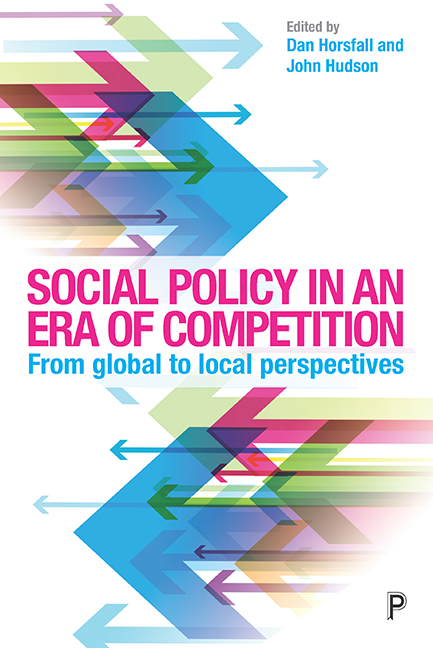Book contents
- Frontmatter
- Contents
- List of figures, tables and boxes
- List of contributors
- List of abbreviations
- Introduction: social policy in an era of competition
- Part One Global competition as the context for welfare
- Part Two The impact of intensifed competition on local governance
- Part Three The reframing of welfare discourses in an era of competition
- Part Four Conclusions
- References
- Index
eight - Rewriting the contract? Conditionality, welfare reform and the rights and responsibilities of disabled people
Published online by Cambridge University Press: 05 April 2022
- Frontmatter
- Contents
- List of figures, tables and boxes
- List of contributors
- List of abbreviations
- Introduction: social policy in an era of competition
- Part One Global competition as the context for welfare
- Part Two The impact of intensifed competition on local governance
- Part Three The reframing of welfare discourses in an era of competition
- Part Four Conclusions
- References
- Index
Summary
Introduction
The ongoing shift from the so-called ‘passive’ welfare state of the past to the ‘active’ welfare state of today (Walters, 1997) and the conditionality at the heart of welfare state reform within and beyond Europe have generated extensive discussion (for example, Cox, 1998; Dwyer, 1998, 2004; Goul Andersen et al, 2002; Deacon, 2005; Dean et al, 2005; Wright, 2012). Central to this shift has been a requirement that certain groups of disabled citizens who had previously enjoyed access to largely unconditional social security benefits due to sickness and impairment should now become ‘responsible’ active agents in their own welfare by seeking or preparing for paid work, rather than relying on social security benefits. The rolling-out of a principle of conditionality, which holds that eligibility to certain basic, publicly provided welfare entitlements should be dependent on an individual's first agreeing to meet particular compulsory duties or patterns of behaviour (Deacon, 1994) has been one way in which UK governments of various political persuasions have sought to rewrite ‘the terms and conditions of the welfare contract’ (Buck et al, 2006, p 1).
Commentators have highlighted the links between contemporary forms of conditionality and the founding principles of the British welfare state, in which the interrelationship between social security and the social contractual obligations of individual citizens were made explicit in the Beveridge Report (1942) (Freud, 2007; DWP, 2008). However, it is apparent that there has been an intensification of conditionality in many Western welfare states in recent decades, with enhanced use of sanctions and realigned relationships between entitlement, conduct and support (Handler, 2004; Betzelt and Bothfeld, 2011). In the UK these new forms of conditionality seek to limit the rights of social citizenship (Marshall, 1950) by increasing the conditional requirements of welfare access in respect of disability-, incapacity- and unemployment-related welfare benefits (Dwyer, 1998; DWP, 2008; Gregg, 2008; Griggs and Evans, 2010; Patrick, 2011; Rolfe, 2012), as well as in the fields of housing, homelessness (King, 2004; Johnsen and Fitzpatrick, 2010; Flint et al, 2011; HM Government, 2011) and migration (Dwyer, 2010).
- Type
- Chapter
- Information
- Social Policy in an Era of CompetitionFrom Global to Local Perspectives, pp. 135 - 148Publisher: Bristol University PressPrint publication year: 2017



